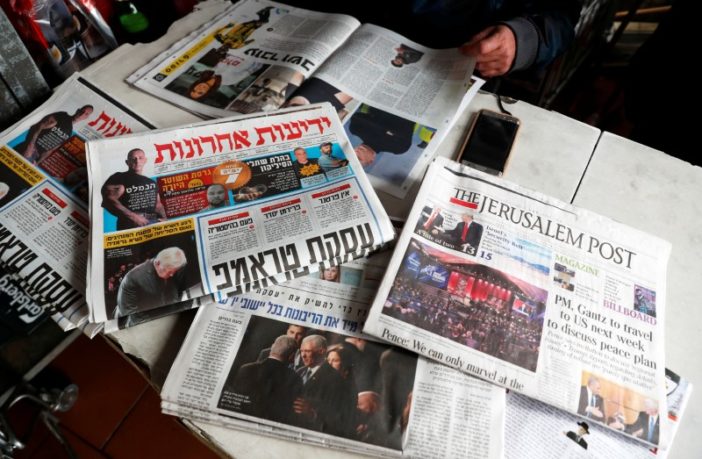As U.S. President Donald Trump prepares to host Israeli leaders in Washington to reveal details of his long-delayed Middle East peace plan, Palestinians warned on Friday that no deal could work without them on board.
Trump invited Israeli Prime Minister Benjamin Netanyahu and his chief rival centrist former general Benny Gantz to the White House next week, saying he would reveal details of his plan before his Tuesday meeting with Netanyahu.
But Nabil Abu Rudeineh, spokesman for Palestinian President Mahmoud Abbas, said there had been no communication with the Trump administration, and that no peace deal could be implemented without “the approval of the Palestinian people and the Palestinian leadership”.
“This is the only way if they are serious, if they are looking for stability in the whole region,” Rudeinah said.
Israeli-Palestinian peace talks collapsed in 2014 and Palestinians have called Trump’s proposal dead in the water, even before its publication, citing what they see as his pro-Israel policies.
The Palestinians have boycotted political dealings with the Trump administration since it reversed decades of U.S. policy on the conflict, splintering the international consensus.
It has refused to endorse the two-state solution – the longtime international peace formula that envisages a Palestinian state established in territory that Israel captured in the 1967 Middle East war.
The Trump administration also recognised Jerusalem as Israel’s capital and moved its embassy there, and announced that Washington no longer views Israeli settlements on occupied West Bank land as “inconsistent with international law”.
Palestinians and most of the international community see the settlements as illegal under the 1949 Geneva Conventions that bar populating land captured in war. Israel disputes this, citing historical, biblical and political connections to the land, as well as security needs.
Palestinians obtained limited self-rule in parts of the West Bank under mid-1990s interim peace accords. They now seek East Jerusalem as the capital of a future state comprising the West Bank and Gaza Strip. Israel withdrew from tiny Gaza in 2005.
Trump, speaking to reporters on his flight home from the World Economic Forum in Davos, acknowledged Palestinians might react negatively to his plan at first but that “it’s actually very positive for them”.
“It’s a great plan. It’s a plan that really would work.”
By contrast Netanyahu immediately accepted Trump’s invite.
“I think the president is seeking to give Israel the peace and security that it deserves,” Netanyahu said on Thursday,
Gantz’s office did not immediately confirm whether he accepted Trump’s invitation.
CLASHING PERSPECTIVES
The political aspects of Trump’s peace initiative have been kept under wraps. Only the economic proposals have been unveiled, anchored by a $50 billion regional development plan – which Palestinians spurned as it did not address an end to Israeli occupation.
Israeli headlines on Friday referred to the “Trump Summit” and “Trump Deal”. Nahum Barnea, a political analyst in Yedioth Ahronoth newspaper, expected “an American green light” for Israel to annex West Bank settlement blocs and the Jordan Valley, which forms the border with Jordan to the east.
Palestinian newspapers highlighted warnings that such moves would end peace chances and pitch the region into a “new phase”.
In Tel Aviv, Israelis appeared generally supportive of their leaders going to Washington, even without Palestinians.
“We don’t have to go back to the previous peace process that was signed over 25, 30 years ago,” said Yael Rozencwajg, 41, a tech executive from Tel Aviv. “The situation has completely changed since then. Trump has started recognising that.”
In explaining the U.S. change of stance on settlements this month, U.S. Secretary of State Mike Pompeo said the new approach would actually advance peace with the Palestinians “by (speaking) the truth when the facts lead to it”.
Palestinians challenged the U.S. and Israeli stances.
In al-Auja, a Jordan Valley village flanked by Israeli settlements, Salim Abu Kharbesh, 59, said: “We are the inhabitants of the land, and they have come to us in spite of us, and in violence. They own nothing in this land.”
In Gaza, now ruled by Palestinian Islamist movement Hamas which has fought several wars with Israel, Hamas spokesman Fawzi Barhoum said no U.S. plan could alter realities on the ground.
“Our people will not accept it, and will confront it with all their might,” he said.




